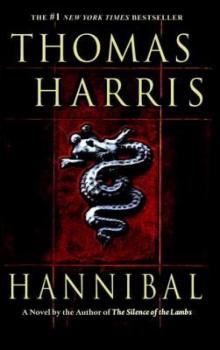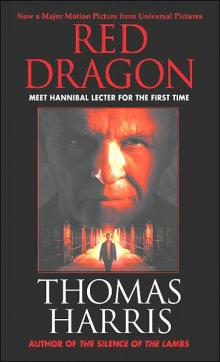- Home
- Thomas Harris
Hannibal Rising Page 16
Hannibal Rising Read online
Page 16
A guard sat beside the boat’s gangway at a table made from a wooden box. He was eating a sausage with his pocketknife and smoking at the same time. He wiped his hands on his handkerchief to perform a pat-down, then recognized Kolnas and sent him past with a jerk of his head.
Kolnas did not meet often with the others, having a life of his own. He went about his restaurant kitchen with his bowl, sampling everything, and he had gained weight since the war.
Zigmas Milko, lean as ever, let him into the cabin.
Vladis Grutas was on a leather settee getting a pedicure from a woman with a bruise on her cheek. She looked cowed and was too old to sell. Grutas looked up with the pleasant, open expression that was often a sign of temper. The boat captain played cards at a chart table with a boulder-bellied thug named Mueller, late of the SS Dirlewanger Brigade, whose prison tattoos covered the back of his neck and his hands and continued up his sleeves out of sight. When Grutas turned his pale eyes on the players, they folded the cards and left the cabin.
Kolnas did not waste time on greetings.
“Dortlich’s dog tag was jammed in his teeth. Good German stainless steel, didn’t melt, didn’t burn. The boy will have yours too, and mine and Milko’s, and Grentz’s.”
“You told Dortlich to search the lodge four years ago,” Milko said.
“Poked around with his picnic fork, lazy bastard,” Grutas said. He pushed the woman away with his foot, never looking at her, and she hurried out of the cabin.
“Where is he, this poison little boy who kills Dortlich?” Milko said.
Kolnas shrugged. “A student in Paris. I don’t know how he got the visa. He used it going in. No information on him coming out. They don’t know where he is.”
“What if he goes to the police?” Kolnas said.
“With what?” Grutas said. “Baby memories, child nightmares, old dog tags?”
“Dortlich could have told him how he telephones me to get in touch with you,” Kolnas said.
Grutas shrugged. “The boy will try to be a nuisance.”
Milko snorted. “A nuisance? I would say he was nuisance enough to Dortlich. Killing Dortlich could not have been easy; he probably shot him in the back.”
“Ivanov owes me,” Grutas said. “Soviet Embassy security will point out little Hannibal, and we will do the rest. So Kolnas will not worry.”
Muffled cries and the sound of blows came from elsewhere in the boat. The men paid no attention.
“Taking over from Dortlich will be Svenka,” Kolnas said, to show he was not worrying.
“Do we want him?” Milko said.
Kolnas shrugged. “We have to have him. Svenka worked with Dortlich two years. He has our items. He’s the only link we have left to the pictures. He sees the deportees, he can mark the decent-looking ones for DPC Bremerhaven. We can get them from there.”
Frightened by the Pleven Plan’s potential for rearming Germany Joseph Stalin was purging Eastern Europe with mass deportations. The jammed trains ran weekly to death in the labor camps in Siberia, and to misery in refugee camps in the West. The desperate deportees provided Grutas with a rich supply of women and boys. He stood behind his merchandise. His morphine was German medical-grade. He supplied AC/DC converters for the black-market appliances, and made any mental adjustments his human merchandise required in order to perform.
Grutas was pensive. “Was this Svenka at the front?” They did not believe anyone innocent of the Eastern Front could be truly practical.
Kolnas shrugged. “He sounds young on the telephone. Dortlich had some arrangements.”
“We’ll bring everything out now. It’s too soon to sell, but we need to get it out. When is he calling again?”
“Friday.”
“Tell him to do it now.”
“He’ll want out. He’ll want papers.”
“We can get him to Rome. I don’t know if we want him here. Promise him whatever, you know?”
“The art is hot,” Kolnas said.
“Go back to your restaurant, Kolnas. Keep feeding the flics for free and they will keep tearing up your traffic tickets. Bring some profiteroles next time you come down here to bleat.”
“He’s all right,” Grutas told Milko, when Kolnas was gone.
“I hope so,” Milko said. “I don’t want to run a restaurant.”
“Dieter! Where is Dieter?” Grutas pounded on a cabin door on the lower deck, and shoved it open.
Two frightened young women were sitting on their bunks, each chained by a wrist to the pipe frame of the bunk. Dieter, twenty-five, held one of them by a fistful of her hair.
“You bruise their faces, split their lip, the money goes down,” Grutas said. “And that one is mine for now.”
Dieter released the woman’s hair and rummaged in the manifold contents of his pockets for a key. “Eva!”
The older woman came into the cabin and stood close to the wall.
“Clean that one up and Mueller will take her to the house,” Dieter said.
Grutas and Milko walked through the warehouse to the car. In a special area bound off by a rope were crates marked HOUSEHOLD. Grutas spotted among the appliances a British refrigerator.
“Milko, do you know why the English drink warm beer? Because they have Lucas refrigerators. Not for my house. I want Kelvinator, Frigidaire, Magnavox, Curtis-Mathis. I want all made in America.” Grutas raised the cover of an upright piano and played a few notes. “This is a whorehouse piano. I don’t want it. Kolnas found me a Bösendorfer. The best. Pick it up in Paris, Milko … when you do the other thing.”
47
KNOWING HE WOULD not come to her until he was scrubbed and groomed, she waited in his room. He had never invited her there, and she did not poke around. She looked at the drawings on the walls, the medical illustrations that filled one half of the room. She stretched out on his bed in the perfect order of the Japanese half beneath the eaves. On a small shelf facing the bed was a framed picture covered by a silk cloth embroidered with night herons. Lying on her side Lady Murasaki reached over and lifted the silk. It covered a beautiful drawing of her naked in the bath at the chateau, in pencil and chalk and tinted with pastel. The drawing was signed with the chop for Eternity in Eight Strokes and the Japanese symbols in the grass style, and not strictly correct, for “water flowers.”
She looked at it for a long time, and then she covered it and closed her eyes, a poem of Yosano Akiko running in her head:
Amid the notes of my koto is another
Deep mysterious tone,
A sound that comes from
Within my own breast.
Shortly after daylight on the second day she heard footsteps on the stairs. A key in the lock, and Hannibal stood there, scruffy and tired, his pack hanging from his hand.
Lady Murasaki was standing.
“Hannibal, I need to hear your heart,” she said. “Robert’s heart went silent. Your heart stopped in my dreams.” She went to him and put her ear against his chest. “You smell of smoke and blood.”
“You smell of jasmine and green tea. You smell of peace.”
“Do you have wounds?”
“No.”
Her face was against the scorched dog tags hanging around Hannibal’s neck. She took them out of his shirt.
“Did you take these from the dead?”
“What dead would that be?”
“The Soviet police know who you are. Inspector Popil came to see me. If you go directly to him he will help you.”
“These men are not dead. They are very much alive.”
“Are they in France? Then give them to Inspector Popil.”
“Give them to the French police? Why?” He shook his head. “Tomorrow is Sunday—do I have that right?”
“Yes, Sunday.”
“Come with me tomorrow. I’ll pick you up. I want you to look at a beast with me and tell me he should fear the French police.”
“Inspector Popil—”
“When you see Inspector Popil
, tell him I have some mail for him.” Hannibal’s head was nodding.
“Where do you bathe?”
“The hazard shower in the lab,” he said. “I’m going down there now.”
“Would you like some food?”
“No, thank you.”
“Then sleep,” she said. “I will go with you tomorrow. And the days after that.”
48
HANNIBAL LECTER’S motorcycle was a BMW boxer twin left behind by the retreating German army. It was resprayed flat black and had low handlebars and a pillion seat. Lady Murasaki rode behind him, her headband and boots giving her a touch of Paris Apache. She held on to Hannibal, her hands lightly on his ribs.
Rain had fallen in the night and the pavement now was clean and dry in the sunny morning, grippy when they leaned into the curves on the road through the forest of Fontainebleau, flashing through the stripes of tree shadow and sunlight across the road, the air hanging cool in the dips, then warm in their faces as they crossed the open glades.
The angle of a lean on a motorcycle feels exaggerated on the pillion, and Hannibal felt her behind him trying to correct it for the first few miles, but then she got the feel of it, the last five degrees being on faith, and her weight became one with his as they sped through the forest. They passed a hedge full of honeysuckle and the air was sweet enough to taste on her lips. Hot tar and honeysuckle.
The Café de L’Este is on the west bank of the Seine about a half-mile from the village of Fontainebleau, with a pleasant prospect of woods across the river. The motorcycle went silent, and began to tick as it cooled. Near the entrance to the café terrace is an aviary and the birds in it are ortolans, a sub-rosa specialty of the café. Ordinances against the serving of ortolans came and went. They were listed on the menu as larks. The ortolan is a good singer, and these were enjoying the sunshine.
Hannibal and Lady Murasaki paused to look at them.
“So small, so beautiful,” she said, her blood still up from the ride.
Hannibal rested his forehead against the cage. The little birds turned their heads to look at him using one eye at a time. Their songs were the Baltic dialect he heard in the woods at home. “They’re just like us,” he said. “They can smell the others cooking, and still they try to sing. Come.”
Three quarters of the terrace tables were taken, a mixture of country and town in Sunday clothes, eating an early lunch. The waiter found a place for them.
A table of men next to them had ordered ortolans all around. When the little roasted birds arrived, they bent low over their plates and tented their napkins over their heads to keep all the aroma in.
Hannibal sniffed their wine from the next table and determined it was corked. He watched without expression as, oblivious, they drank it anyway.
“Would you like an ice cream sundae?”
“Perfect.”
Hannibal went inside the restaurant. He paused before the specials chalked on the blackboard while he read the restaurant license posted near the cash register.
In the corridor was a door marked Privé. The corridor was empty. The door was not locked. Hannibal opened it and went down the basement steps. In a partly opened crate was an American dishwasher. He bent to read the shipping label.
Hercule, the restaurant helper, came down the stairs carrying a basket of soiled napkins. “What are you doing down here, this is private.”
Hannibal turned and spoke English. “Well, where is it then? The door says privy, doesn’t it? I come down here and there’s only the basement. The loo, man, the pissoir, the toilet, where is it? Speak English. Do you understand loo? Tell me quickly, I’m caught rather short.”
“Privé, privé!” Hercule gestured up the stairs. “Toilette!” and at the top waved Hannibal in the right direction.
He arrived back at the table as the sundaes arrived. “Kolnas is using the name ‘Kleber.’ It’s on the license. Monsieur Kleber residing on the Rue Juliana. Ahhh, regard.”
Petras Kolnas came onto the terrace with his family, dressed for church.
The conversations around Hannibal took on a swoony sound as he looked at Kolnas, and dark motes swarmed in his vision.
Kolnas’ suit was of inky new broadcloth, a Rotary pin in the lapel. His wife and two children were handsome, Germanic-looking. In the sun, the short red hairs and whiskers on Kolnas’ face gleamed like hog bristles. Kolnas went to the cash register. He lifted his son onto a barstool.
“Kolnas the Prosperous,” Hannibal said. “The Restaurateur. The Gourmand. He’s come by to check the till on his way to church. How neat he is.”
The headwaiter took the reservation book from beside the telephone and opened it for Kolnas’ inspection.
“Remember us in your prayers, Monsieur,” the headwaiter said.
Kolnas nodded. Shielding his movement from the diners with his thick body, he took a Webley .455 revolver from his waistband, put it on a curtained shelf beneath the cash register and smoothed down his waistcoat. He selected some shiny coins from the till and wiped them with his handkerchief. He gave one to the boy on the barstool. “This is your offering for church, put it in your pocket.”
He bent and gave the other to his little daughter.
“Here is your offering, liebchen. Don’t put it in your mouth. Put it safe in the pocket!”
Some drinkers at the bar engaged Kolnas and there were customers to greet. He showed his son how to give a firm handshake. His daughter let go of his pants leg and toddled between the tables, adorable in ruffles and a lacy bonnet and baby jewelry customers smiling at her.
Hannibal took the cherry from the top of his sundae and held it at the edge of the table. The child came to get it, her hand extended, her thumb and forefinger ready to pluck. Hannibal’s eyes were bright. His tongue appeared briefly, and then he sang to the child.
“Ein Mannlein steht im Walde ganz still und stumm— do you know that song?”
While she ate the cherry, Hannibal slipped something into her pocket. “Es hat von lauter Purpur ein Mantlein um.”
Suddenly Kolnas was beside the table. He picked his daughter up. “She doesn’t know that song.”
“You must know it, you don’t sound French to me.”
“Neither do you, Monsieur,” Kolnas said. “I would not guess that you and your wife are French. We’re all French now.”
Hannibal and Lady Murasaki watched Kolnas bundle his family into a Traction Avant.
“Lovely children,” she said. “A beautiful little girl.”
“Yes,” Hannibal said. “She’s wearing Mischa’s bracelet.”
High above the altar at the Church of the Redeemer is a particularly bloody representation of Christ on the cross, a seventeenth-century spoil from Sicily. Beneath the hanging Christ, the priest raised the communion cup.
“Drink,” he said. “This is my blood, shed for the remission of your sins.” He held up the wafer. “This is my body broken for you, sacrificed that you might not perish, but have everlasting life. Take, eat, and as oft as ye do this, do it in remembrance of me.”
Kolnas, carrying his children in his arms, took the wafer in his mouth, and returned to the pew beside his wife. The line shuffled around and then the collection plate was passed. Kolnas whispered to his son. The child took a coin from his pocket and put it in the plate. Kolnas whispered to his daughter, who sometimes was reluctant to give up her offering.
“Katerina …”
The little girl felt in her pocket and put into the plate a scorched dog tag with the name Petras Kolnas. Kolnas did not see it until the steward took the dog tag from the plate and returned it, waiting with a patient smile for Kolnas to replace the dog tag with a coin.
49
ON LADY MURASAKI’S terrace a weeping cherry in a planter overhung the table, its lowest tendrils brushing Hannibal’s hair as he sat across from her. Above her shoulder floodlit Sacré Coeur hung in the night sky like a drop of the moon.
She was playing Miyagi Michio’s “The Sea in Spring�
�� on the long and elegant koto. Her hair was down, the lamplight warm on her skin. She looked steadily at Hannibal as she played.
She was difficult to read, a quality Hannibal found refreshing much of the time. Over the years he had learned to proceed, not with caution, but with care.
The music slowed progressively. The last note rang still. A suzumushi cricket in a cage answered the koto. She put a sliver of cucumber between the bars and the cricket pulled it inside. She seemed to look through Hannibal, beyond him, at a distant mountain, and then he felt her attention envelop him as she spoke the familiar words. “I see you and the cricket sings in concert with my heart.”
“My heart hops at the sight of you, who taught my heart to sing,” he said.
“Give them to Inspector Popil. Kolnas and the rest of them.”
Hannibal finished his sake and put down the cup. “It’s Kolnas’ children, isn’t it? You fold cranes for the children.”
“I fold cranes for your soul, Hannibal. You are drawn into the dark.”
“Not drawn. When I couldn’t speak I was not drawn into silence, silence captured me.”
“Out of the silence you came to me, and you spoke to me. I know you, Hannibal, and it is not easy knowledge. You are drawn toward the darkness, but you are also drawn to me.”
“On the bridge of dreams.”
The lute made a little noise as she put it down. She extended her hand to him. He got to his feet, the cherry trailing across his cheek, and she led him toward the bath. The water was steaming. Candles burned beside the water. She invited him to sit on a tatami. They were facing knee to knee, their faces a foot apart.
“Hannibal, come home with me to Japan. You could practice at a clinic in my father’s country house. There is much to do. We would be there together.” She leaned close to him. She kissed his forehead. “In Hiroshima green plants push up through ashes to the light.” She touched his face. “If you are scorched earth, I will be warm rain.”

 The Silence of the Lambs
The Silence of the Lambs Red Dragon
Red Dragon Hannibal
Hannibal Black Sunday
Black Sunday Cari Mora
Cari Mora Hannibal Rising
Hannibal Rising Red Dragon hl-1
Red Dragon hl-1 The Silence of the Lambs (Hannibal Lecter)
The Silence of the Lambs (Hannibal Lecter)